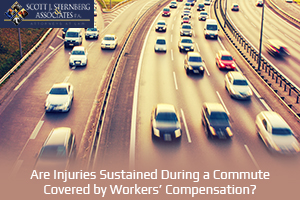There can be some confusion in determining whether an injury suffered while commuting to and from work can be covered by workers’ compensation. Most jurisdictions – including Florida – look to what is often called the coming and going rule.
If the injury happens while going to or coming from the employer’s premises, the workers’ compensation policy will exclude any coverage. The hard and fast rule that a person is away from the premises and not engaged in any work-related task comes into play here.
This area can get a little gray at times, and in this type of case a workers’ compensation attorney should be consulted to determine whether an exception should be made.
Are there exceptions to the coming and going rule for workers’ compensation?
There are instances when the employee will be covered by a workers’ compensation policy when they are away from the employer’s premises. If the person was traveling between places that they have to call on during the normal course of their job and they are involved in an accident, their injuries may be covered under workers’ comp. For instance, a janitor who travels to multiple sites in one day to clean offices may be able to make a claim based on the fact that, even though they were not on the employer’s premises when injured, they would not have been where the accident occurred if they weren’t headed to another work-related task.
Similarly, people in white collar positions who commute to see customers, perform inspections, or any other off-premises function may be covered for an injury suffered while traveling to these locations – as well as injuries suffered while at them. Determining whether injuries in these situations are covered is important, as the policy not only covers medical expenses, but it will also pay a portion of the injured worker’s salary until they will be able to return to work.
There is another case where an injury that occurs while driving to or from work may be covered by workers’ compensation. If an employer requests that the employee go somewhere on their behalf to perform a duty under the normal scope of the employer’s business as a special favor, a claim may be covered. The same goes if the employee is doing a special personal favor for the employer, like getting something at the store for the employer or the office. Any injury arising out of this activity should be compensable by the policy.
Once the injury occurs, the employee should report it to the employer and an incident report should be filled out. Even if the employee does not believe it will be covered, they should still take the steps necessary to get an incident report on file.
The timing of the claim is crucial; the sooner it is reported the sooner eligibility can be determined by the insurance carrier. An employee has thirty days to make a report, but doing so immediately after the injury is the best recourse.
If your employer does not inform the insurance company and tries to stonewall the claim, the employee has the right to make the carrier aware of the situation. Often, workers’ compensation claims get bogged down by stonewalling tactics like this, and that is when it is useful to have an experienced workers’ compensation attorney on your side.
As can be seen by the examples above, there are some rules that might seem to deny coverage for injuries during a work commute. But every case has its own set of circumstances, and professional advice in this area may be crucial for both you and your family. If you have suffered an injury on your way to or from work, or at any location offsite during work hours, contact the offices of Sternberg | Forsythe, P.A. and Associates to find out how we can help you pursue your claim.
Additional Reading:

